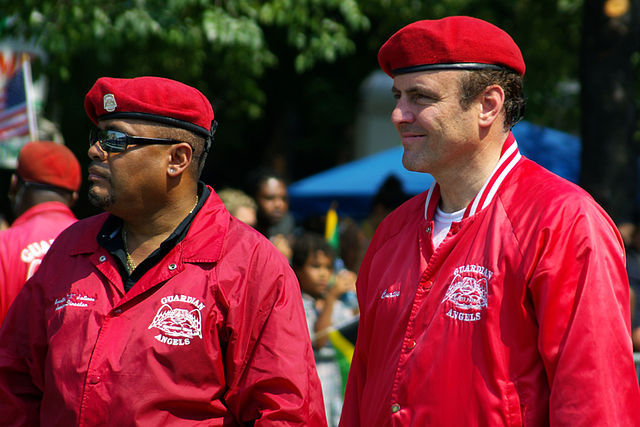What we can learn from New York City’s Guardian Angels
The Guardian Angels, a crime patrol organization from the 70’s offers insight into the future of community policing.

BY KSENIA BAATZ
The Guardian Angels are back in full force in NYC with their signature red berets and bomber jackets emblazoned with a masonic eye.
The Guardian Angels are a safety patrol that was founded by thirteen high school friends who worked together at a McDonalds in 1979. They began patrolling the 4 line of the subway, known at the time as the “Muggers Express,” with an emphasis on community-based solutions and unarmed, nonviolent intervention. Since the start of the COVID-19 pandemic, the Guardian Angels’ membership has ballooned from roughly 70 to over 400 trained patrol members in NYC.
“We were going to defend those who couldn’t defend themselves,” said Arnaldo “13” Salinas, a founding member of the Guardian Angels. “We started from within the rock brigade, a smaller cadre of people. Young men of all races, colors, ethnicities, and we decided to call ourselves the magnificent 13 subway patrol and that’s where we went.”
In poetic terms, the organization’s mission is to “go out and help those that can’t help themselves.” In reality, it is a highly organized, community based and strictly unarmed service group.
The journey to earn a red beret begins with thorough vetting.
“If I’m interviewing a young man or woman, and I ask them why they want to join and they say, ‘Well, five months ago, my mom was mugged and hurt. I’m out for revenge’ — well, you’re not going to don a red jacket,” Salinas said. “We’re looking for people that genuinely need to give back.”
Then the training begins. According to the Angels’ training manual from 2003, patrol members must complete a three month program covering martial arts, de-escalation techniques, citizen arrests, and first aid alongside more semantic details such as how to take care of your red beret. The manuals are unique to each chapter and used as guidelines. Additional training is modified based on the chapter and the community’s needs.
The Angels’ most significant feature is their emphasis on community based solutions and hiring which has allowed them to sidestep some of the pitfalls of the New York City Police Department. Because their chapters hire from the neighborhoods where they are based, their team’s makeup often reflects the community they work in. Furthermore, the Angels only patrol a neighborhood or open a chapter when there is a request filed, ensuring that they have community support. The Angels have a strict weapon-free policy that, if broken, results in dismissal from the patrol. In neighborhoods where police are often heavily armed and militarized, the Guardian Angels provide a different approach, emphasizing violence as a last resort.
The Guardian Angels community ties allow them to mobilize quickly and adapt to specific neighborhood needs. In response to rising AAPI Hate crimes during the COVID-19 pandemic, the Guardian Angel Chinatown chapter increased patrols at night and began a campaign to support local restaurants that faced a drop in business.
At the same time, crime fell throughout the Upper West Side as people sheltered at home. The Upper West Side chapter decided to shift gear and distribute food, personal protectional equipment such as masks and sanitary equipment such as soap and hand sanitizer to the increasing number of unhoused people living on the streets.
Their community work extends past security into their Junior Angels program.
“Madison Square Garden will give us tickets to take our kids to wrestling and other shows,” Salinas said. “We take them upstate to go pumpkin or apple picking and generally the owners of the patches will allow us to go in at no cost. We take from the good of the people to sort of spread it around.”
The junior program also involves everyday and educational activities such as homework help and self defense classes. This everyday help and interaction create a sense of trust to the community they work with, something police organizations have struggled with.
The success of the Guardian Angels has been mixed. Paula Jackson, a longtime Upper West Side resident, was not aware of any current impact they had on the neighborhood. Although their programs may not be as well known, their reputation is as vivid as their all crimson uniform.
“I’ve only seen them on the subway but I will say that they were a comfort to see when NYC wasn’t safe,” said Sean Mckenna, an Upper West Side resident.
The Angels have received both criticism and commendation from authorities in the past 43 years that they have been active. In the 1990s, the group faced criticism for fast-tracking their training process to bolster their numbers. More recently, a number of local politicians on the Upper East Side accused the Angels of fear mongering against shelter projects. Government investigations from the 1980’s found that the Angels had a limited effect on crime rates although they reported a positive effect on citizens’ perception of safety. At the same time the Angels have received widespread support from former New York mayors and their cyber security division (CyberAngels) received a Presidential Service Award in 1998.
“You can have every person go out and do what we [Guardian Angels] do but it’s a BandAid on a gunshot … we have to create a better organized and empathetic government as New Yorkers to fix this problem,” Salinas said.
The Guardian Angels has spread to over 130 cities and 13 countries worldwide.






